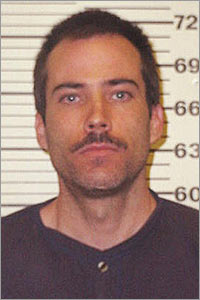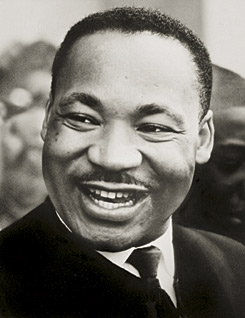Seven years ago today, on 29 January 1998, an anti-personnel bomb studded with nails exploded at the New Woman All Women health clinic in Birmingham. The clinic was targeted for bombing because it provided abortions; a nurse named Emily Lyons was maimed in the explosion and Robert Sanderson, an off-duty police officer working for the clinic as a security guard, was killed. An anti-abortion fanatic claiming to be a member of the Army of God
sent anonymous letters to the media taking credit for the bombing; the murderer was probably Eric Robert Rudolph, also suspected in the bombing of an abortion clinic, a lesbian nightclub, and the 1996 Olympics in Atlanta.
 Rudolph was finally captured in May 2003, and he is now standing trial for murder in Birmingham, and awaits trial in Georgia for the Atlanta bombings. I think that at this point there is every reason to believe that he’s guilty as hell, and also that he will be convicted of cold-blooded murder and justice will be done. Of course justice will not bring Robert Sanderson back and it will not heal Emily Lyons’ wounds. But it is something to hope for, even if any victory in this case will be one gained with terrible sadness.
Rudolph was finally captured in May 2003, and he is now standing trial for murder in Birmingham, and awaits trial in Georgia for the Atlanta bombings. I think that at this point there is every reason to believe that he’s guilty as hell, and also that he will be convicted of cold-blooded murder and justice will be done. Of course justice will not bring Robert Sanderson back and it will not heal Emily Lyons’ wounds. But it is something to hope for, even if any victory in this case will be one gained with terrible sadness.
This seems, actually, to be a point that unites nearly everyone. Both pro-choicers and most anti-abortionists have condemned Rudolph as a dangerous fanatic, a murderer, and a terrorist; both pro-choice and pro-life
organizations issued public statements celebrating Rudolph’s capture. Now, I don’t want to spoil this remarkable point of unity against violence. But the simple truth is that I don’t know how it can be supported. I understand why I am glad that Rudolph is finally facing murder charges, and why my fellow pro-choicers and I condemn him as a murderer. But I don’t see how most of the anti-abortion movement’s reaction to Rudolph could result from anything other than a profound distortion of their beliefs. Let me explain.
Most people who oppose abortion–at least, most of those who express their opposition as part of the organized and agitating anti-abortion movement–claim to believe that, as a matter of moral principle, abortion under almost all circumstances is murder. They tell us that that is why they oppose it: that the intentional killing of an embryo or a fetus is a violation of the rights of that embryo or fetus just as much as infanticide is a violation of the rights of the baby.
Now, I think that this claim is outrageously false, and that the arguments for it use profoundly misogynist premises in order to justify the most brutal sorts of State violence against women. But my beliefs aren’t the issue here. The question is whether pro-lifers actually believe this. Let’s take a quick review of the facts
(thanks to the Alan Guttmacher Institute):
About 1/2 of all unplanned pregnancies in the United States are terminated in abortion.
Every year, about 2 out of every 100 women aged 15-44 has an abortion.
In 2000, in the United States alone, about were 1,360,000 abortions performed. About 1,300,000-1,400,000 abortions are performed every single year in the United States; from 1973, when Roe v. Wade decriminalized abortion in all 50 states, to 2000, about 39,000,000 abortions were performed.
For those of us who believe that abortion is a woman’s right, these numbers may or may not be troubling, depending on what they tell us about other issues that we care about (such as the availability of contraception and responsible sex education). But consider what they mean to someone who earnestly believes that almost every single abortion is an act of murder. If you really believe that, and you have even a marginally adequate grasp on how common abortion is, then a fortiori you must believe that well over 1,000,000 people are being murdered every single year while the United States government stands by allowing most of those murders and even protecting the women who have them committed and the doctors who they hire to carry them out.
If you earnestly believe that abortion is murder, in other words, you are committed to believing that you are living through what is probably the worst holocaust in the history of humanity. How should someone witnessing murder on so massive a scale, ignored or even protected by the government and sanctioned by official organs of the medical establishment, react?
If that is what you earnestly believe, then why wouldn’t you react as Eric Rudolph and James Kopp did–by setting out to stop abortion providers, injuring or killing them if necessary? You might say Well, that doesn’t seem pro-life at all!
But if someone earnestly believes that abortion is murder, hten why wouldn’t he or she also believe that injuring or even killing an abortion provider in order to stop that murder is a legitimate use of violence in defense of the innocent? Particularly when every single day that passes with an abortion provider healthy and working means that (according to your beliefs) nearly 4,000 more innocent people will be murdered?
Now, I can think of some reasons why someone who earnestly believed abortion to be murder still wouldn’t start attacking abortion providers. The problem is that none of them can account for all the prominent members of the anti-abortion movement, let alone everyone in the anti-abortion rank-and-file. You might, for example, believe that abortion is murder but refuse to use violence to stop it because you’re a principled pacifist, and believe that even violence in defense of self or innocent others is unjustified. Some consistent-ethic-of-life abortion opponents do endorse, or come very close to endorsing, a comprehensive principled pacifism. But most of the anti-abortion movement does not; the Catholic hierarchy mainly supports Just War theory and conservative evangelical abortion opponents such as Jerry Falwell and Pat Robertson loudly trumpet their support for warfare and the death penalty.
You might believe violence in defense of the innocent would be justifiable, if it were an effective means to the end of stopping abortion. But–you might say–it isn’t: it just brings both the cops and public opinion down on the side of the abortionists, and hurts the movement to end abortion through orderly political means. But whether or not this is an accurate assessment of the strategic effects of anti-abortion violence–and I’m not sure that it is–it is not the reason that most pro-lifers who came out against Rudolph’s bombing campaign or Kopp’s murder-by-sniping gave for condemning them. It’s true that many pro-lifers said that they thought actions like these hurt the cause; but besides that, most of them also repeatedly made statements that anti-abortion terrorism is not only strategically foolish, but also morally wrong. Most of them seem quite earnestly to believe that folks like Eric Rudolph and James Kopp are murderers and dangerous lunatics.
But look. If you do think that Eric Rudolph is a dangerous lunatic–and I agree you should–then what can you think about someone who believes exactly what Eric Rudolph believes about abortion, and does not have any principled opposition to the use of force to defend the innocent, and yet, unlike Rudolph, sits back comfortably while doing absolutely absolutely nothing about it? Such a person would be a moral monster of the most wretched sort; perhaps less dangerous than Rudolph, but also even more contemptible. Yet this is exactly the condition that a very large segment of the anti-abortion movement seems to confess to every time they state their basic beliefs about abortion and acceptable political strategy.
Now, the point here is not, of course, to exhort anti-abortionists to take up arms and start shooting. My argument is a modus tollens, not a modus ponens. If you earnestly believe that abortion is murder and that violence in defense of the innocent is justifiable, but do nothing, then you are a moral monster. But principles of charity demand that you try to find some other way to understand a person’s actions, if any plausible candidate is available, other than a way that makes them a moral monster. In this case, the answer is: most people in the anti-abortion movement don’t really believe that abortion is murder.
No, they really don’t. They certainly believe that abortion is wrong. And apparently they believe that it’s wrong in a way that justifies State intervention to stop it. But they cannot honestly and consistently regard it as a violation of an innocent person’s rights just as bad as infanticide without being moral monsters even worse than the murderers they claim to deplore. Since I don’t think they are that, I conclude that they don’t honestly and consistently believe it as anything more than a rhetorical flourish.
Here’s some more reasons to think that this is true:
Most anti-abortionists are roughly aware of the scale of abortion. And most of them say that it shows something is profoundly wrong with our society. But very few actually give any indication, in their language and in their actions, of genuinely believing that they are witnessing mass slaughter on such an unprecedented scale. Those who do talk this way–drawing comparisons to the Holocaust, for example–are mostly folks like Operation Rescue, Joe Scheidler, and further on out to the Army of God, who are marginalized or condemned as lunatic fringe elements.
The fact that most anti-abortionsts do, as I mentioned above, seem to think that when Eric Rudolph bombed New Woman All Women seven years ago he did do something that was not only strategically foolish, but also morally wrong indicates that they are speaking either (1) as principled pacifists or (2) as people who believe that deadly force is not a proportional response to whatever is wrong about abortion. Since (1) clearly doesn’t apply for many, it seems that (2) is what they are best understood as believing. Yet if they believe (2), that just is a good reason to say that they don’t believe that abortion is murder–because if any threatened wrong would permit deadly force as a response, wouldn’t murder be it?
Most anti-abortionists, even while claiming that abortion is murder and ought to be illegal for precisely the same reasons that infanticide is, very conspicuously shy away from claiming that the people primarily responsible for these murders
–women with unwanted pregnancies who procure an abortion–should be punished like murderers are punished. Some (George H. W. Bush, for example) seem to believe that laws should only punish abortion providers and should not punish women who seek abortions at all; almost nobody other than those who already support violence against abortion providers argues that they should be imprisoned for life or executed. Yet if you honestly and consistently believe that these women are guilty of infanticide, then why would you call for the legal system to treat them at all differently from Susan Smith or Andrea Yates? Answer: most abortion opponents don’t honestly and consistently believe that they are guilty of infanticide; however wrong they may think abortion is, their sense of compassion compels them to treat women who seek abortions less harshly than they would ever treat a child murderer.
If what I have been saying is the case, then abortion opponents are better people than Eric Rudolph in spite of their bloody rhetoric of abortion-as-murder. But that also means that they need to give up the bloody rhetoric and they need to give it up now. It is a distortion of their views; they might regard abortion as cruel or tragic or irresponsible but if what I have been saying is true they do not earnestly and consistently think of it as murder. Worse, it’s a distortion of their views that places demands of them that their own sense of compassion and shame prohibits them from ever fulfilling. Nearly all pro-lifers realize that it would be inhuman to punish women who seek abortions as murderers, and that it is wicked to bomb clinics or shoot doctors. Yet to give reasons for seeing these things as wrong they must logically give up on the claim that abortion is murder. As long as they insist on hurling that rhetorical thunderbolt, they are committing their conscience to a principle that demands precisely the actions of an Eric Rudolph or a James Kopp, and they are giving truth to what Ani DiFranco mournfully sang, in the most heartbreaking and fitting commemoration of this day that I know, after the shooting of Dr. Slepian in Buffalo and the bombing in Birmingham:
and the blood poured off the pulpit
the blood poured down the picket line
yeah, the hatred was immediate
and the vengeance was divine
so they went and stuffed god
down the barrel of a gun
and after him
they stuffed his only son
–Ani DiFranco, Hello Birmingham


 Today is Martin Luther King Jr. Day, a day to honor the life and the thought of Dr. King — a hagiographed, ignored, misunderstood, overrated, and indispensable man; one of our greatest Southern heroes; an agitator and a moral witness who gave long years of his life to the cause of the Freedom Movement, and who — underneath the television specials and the holy martyr imagery that so often serves to obscure and empty out his real, fallible, challenging, essential vision — played a vital role (together with
Today is Martin Luther King Jr. Day, a day to honor the life and the thought of Dr. King — a hagiographed, ignored, misunderstood, overrated, and indispensable man; one of our greatest Southern heroes; an agitator and a moral witness who gave long years of his life to the cause of the Freedom Movement, and who — underneath the television specials and the holy martyr imagery that so often serves to obscure and empty out his real, fallible, challenging, essential vision — played a vital role (together with 
 Rudolph was finally captured in May 2003, and he is now standing trial for murder in Birmingham, and awaits trial in Georgia for the Atlanta bombings. I think that at this point there is every reason to believe that he’s guilty as hell, and also that he will be convicted of cold-blooded murder and justice will be done. Of course justice will not bring Robert Sanderson back and it will not heal Emily Lyons’ wounds. But it is something to hope for, even if any victory in this case will be one gained with terrible sadness.
Rudolph was finally captured in May 2003, and he is now standing trial for murder in Birmingham, and awaits trial in Georgia for the Atlanta bombings. I think that at this point there is every reason to believe that he’s guilty as hell, and also that he will be convicted of cold-blooded murder and justice will be done. Of course justice will not bring Robert Sanderson back and it will not heal Emily Lyons’ wounds. But it is something to hope for, even if any victory in this case will be one gained with terrible sadness.